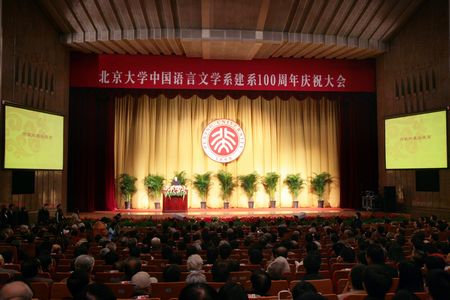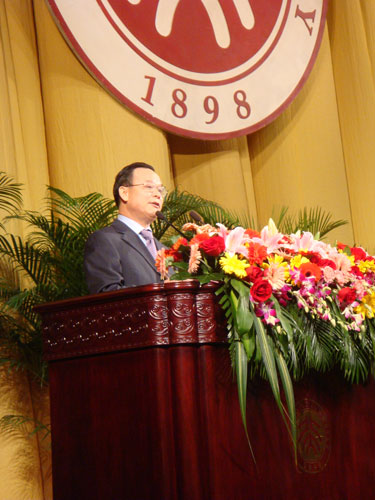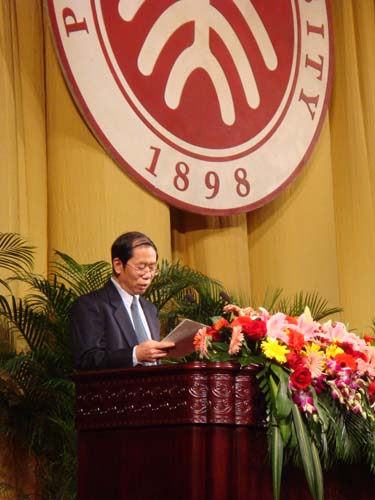Peking University, Oct. 23, 2010: The centennial of PKU Department of Chinese Language and Literature was celebrated on the morning of Oct. 23, marking a new starting point of the most PKU- and China-featured department.
Video clip from PKUTV (in Chinese)

The grand ceremony

Prof. Zhou Qifeng, President of Peking University, at the ceremony

Prof. Chen Pingyuan, dean of PKU Department of Chinese Language and Literature
The grand ceremony took place in PKU Hall, with thousands of attendants—students, faculty, and alumni from all over the world.
The Department of Chinese Language and Literature was originally known as “Wenxue Men” (Discipline of Literature), established in 1910 when the Imperial University of Peking (or Jingshi Daxuetang, 1898-1912), China's first national institution for higher learning in the modern sense, set up faculties for seven disciplines—economics, law, literature, natural sciences, agriculture, engineering, and business. It was the first independent teaching institution on literature among Chinese universities.
In 1919, it was renamed as Chinese Literature Department, consisting Chinese Philology, Literature, and Sifting Chinese Cultural Heritage, which formed the basic structure of the present Department of Chinese and Literature. In 1937, after the outbreak of the Second Sino-Japanese War (1937-45), the department moved with the National Peking University to Changsha, then Kunming, to form the National Southwest Associated University along with Tsinghua and Nankai. After the war, the department of Chinese Literature had restored as Peking University moved back to Beijing (then Beiping) in 1946.
In 1952, the Chinese Literature Department changed into the Department of Chinese Language and Literature after Yenching University was merged into Peking University in an reorganizing effort of departments. The department set up the faculty journalism on the basis of the Department of Journalism of Yenching University, which then became the School of Journalism of Renmin University of China in 1958. In 1954, the major of Linguistics, then the Chinese Linguistics, was strengthened after the department of Linguistics of Sun Yat-sen University joined the university (In 2002, the major of Applied Linguistics was established). In 1959, the newly-established Studies of Ancient Chinese Documents, together with literature and linguistics have been continued to serve as the three pillars of traditional studies.
Among the first National Education Bases for Talent Cultivation, the department now comprises four specialties for Chinese undergraduates, namely, Chinese Literature, Chinese Linguistics, Studies of Ancient Chinese Documents, and Applied Linguistics (Chinese Information Processing), as well as one specialty, Chinese Literature, for overseas students. It consists of 24 specialties and 11 degrees for Master's degree candidates and 7 degrees for doctoral candidates, including Chinese Ancient Literature, Modern and Contemporary Chinese Literature, Theory of Literature and Art, Comparative Literature and World Literature, Chinese philology, Linguistics and Applied Linguistics, and Studies of Ancient Chinese Documents. It also has a post-doctoral research station of the first-class National Key Specialty of Chinese Language and Literature.
At present, the department has 101 faculty members, among which 94 are teachers—48 professors, 38 associate professors, one vice-researcher and seven lecturers, with two "honored professors" of Peking University, one “Cheung Kong Scholar” distinguished professor (awarded by the Ministry of Education), one member of the Academic Degrees Committee of the State Council (ADCSC), two members of Disciplinary Appraisal Panels under the ADCSC, and seven 21st-century Talents of the MOE program.
The department attaches equal importance to teaching and research. In 2007, the discipline of Chinese Language and Literature, with main achievements in the department, was awarded the First-Class National Key Specialty. At present, it has nine teaching and research centers, one institute, a linguistics lab, and 13 virtual research bodies. It also consists of Research Center for Studies of Ancient Chinese Documents and Research Center for Chinese Linguistics, two key research bases for humanities and social sciences of the MOE. Five disciplines were selected as the national key disciplines in the first national assessment of key disciplines (1986-88), including Chinese Ancient Literature, Modern and Contemporary Chinese Literature, Ancient Chinese, Modern Chinese, and Studies of Ancient Chinese Documents. In the second evaluation (2001-02), six disciplines were chosen, including Chinese Ancient Literature, Modern and Contemporary Chinese Literature, Comparative Literature and World Literature, Chinese Philology, Linguistics and Applied Linguistics, and Studies of Ancient Chinese Documents.
Ever since the establishment of “Wenxue Men” of the Imperial University of Peking, the department has been carrying on the traditions generations by generations treasured and advocated by a galaxy of renowned scholars, critics and writers, including Lin Shu, Yan Fu, Chen Duxiu, Lu Xun, Liu Shipei, Wu Mei, Zhou Zuoren, Ma Xulun, Huangkan, Qian Xuantong, Shen Jianshi, Yang Zhensheng, Liu Bannong, Hu Shi, Ma Yuzao, Shen Congwen, and Jin Kaicheng. With noble virtues and talented writing skills, they have been making great contributions to the disciplines, to academics, and to the development of culture and the nation through their convictions to humanities and academics. Moreover, the department has nurtured the late "National Moral Model” Meng Erdong, a respected professor of ancient literature teaching and research section of the department, whose practices reflected the true virtue of an educator. The department opens up the opportunity for every student to appreciate both the charms and researches of previous scholars, but also the appeals of numerous contemporary masters and promising young scholars.
The department enrolled 1,167 undergraduates (955 Chinese students and 209 international students), 731 MA degree candidates (including 75 international students), and 415 PhD candidates (including 68 international students) from 1998 to 2008. It has also trained 217 national teachers, and accepted 253 Chinese visiting scholars, 483 foreign vocational students, and 41 foreign researchers. At present, the total enrollment is 1,089, with 566 undergraduates, 278 master candidates, and 245 doctoral candidates.
For the past century, 10,439 graduates have stepped out from the department into the wider world—7,285 undergraduates, 675 junior college students, 1,701 MA graduates, and 778 PhD graduates—among them 939 are international students.
Extended Reading: A Century of Exploration
Edited by: Jacques
Source: ChinaNews.com.cn and PKU News (Chinese)